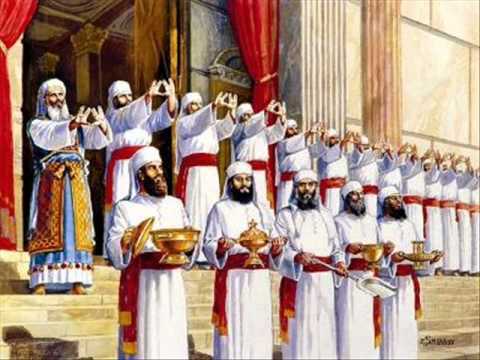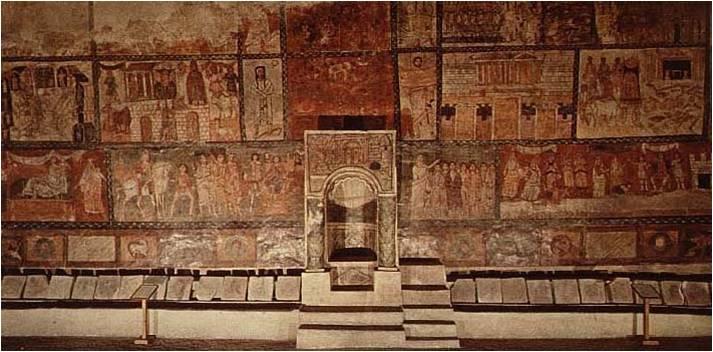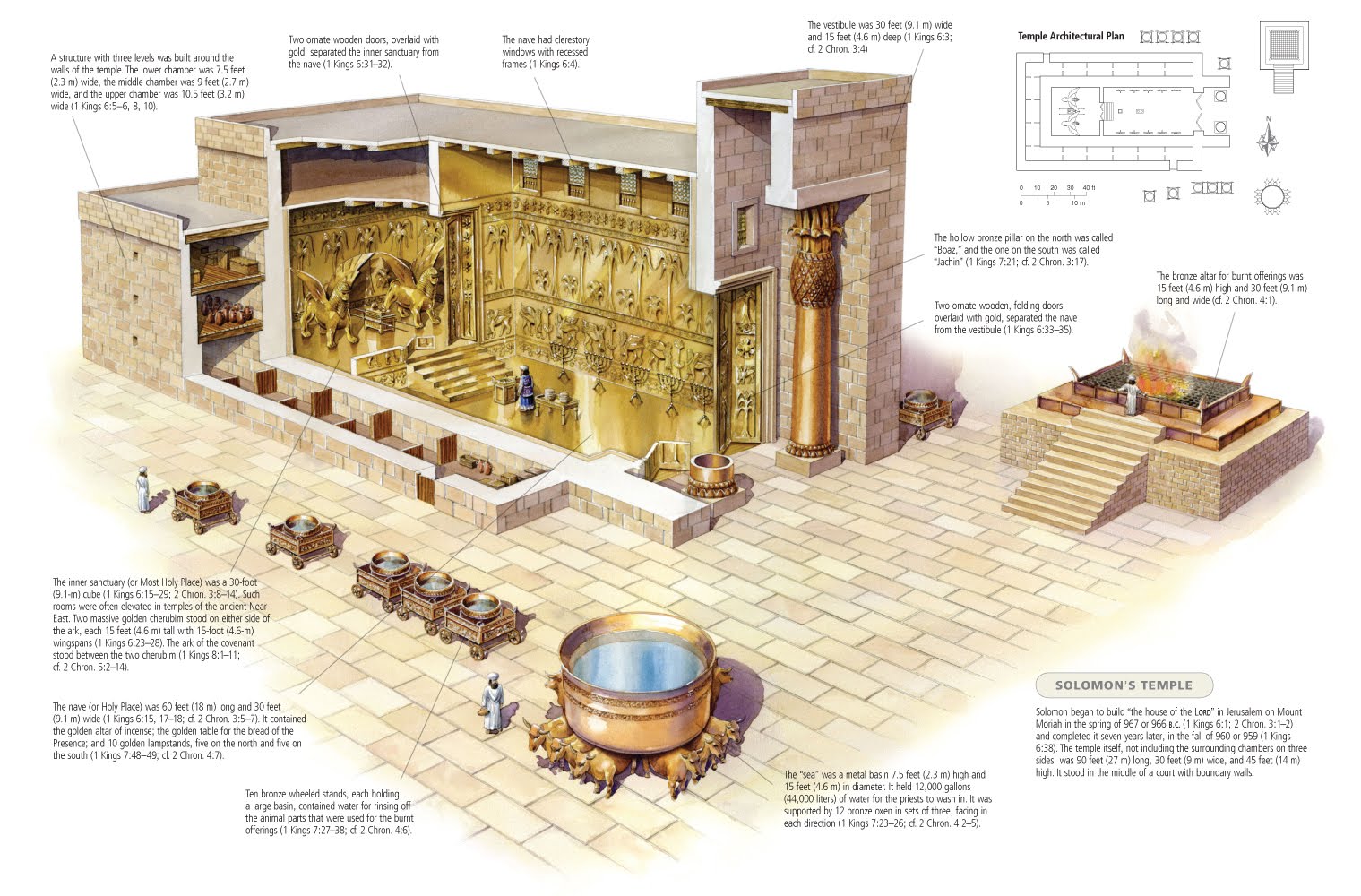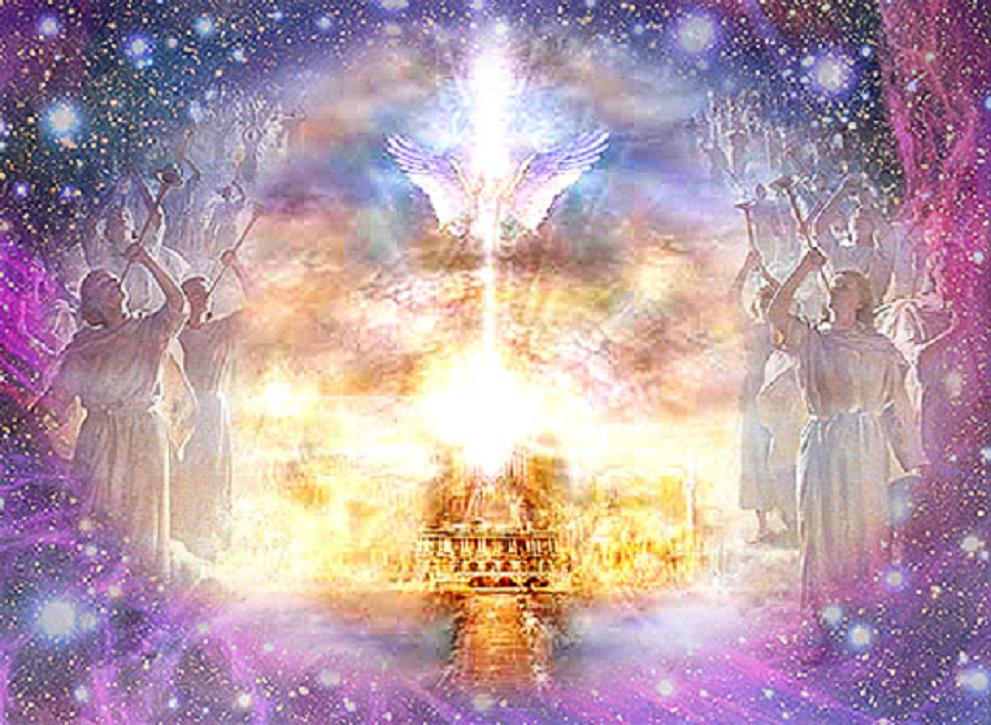- Jan 25, 2009
- 19,765
- 1,428
- Faith
- Oriental Orthodox
- Marital Status
- Private
- Politics
- US-Others
There were so many varied aspects to what it meant to be a priest and often the roles seemed to be interchangeable - even as it concerns offerings and ministry. And this concept was not forgotten among those within the Early Body of believers (including Barnabas - who himself was a Levite according to Acts 4:35-37 ) - many of them also aware of how other things many assumed to be only for the priests were also done by others as well such as certain kings who operated in the roles of Priest, Prophet and King simultaneously....in preview of the Messiah. Even King David's sons were priests according to scripture (2 Samuel 8:17-18) and there were others too who were in priests roles even though they themselves were NOT Levites or of Aaron's line....The regular Levites did non-priestly things..
More on the issue was discussed before in previous discussion here and here in the thread entitled Messianics and Dispensationalism - and for other places:
Gxg (G²);62761694 said:Barnabas being a Levite opens the door for seeing other possibilities. One of the biggest examples being what's seen in the Book of Hebrews and its detailed descriptions of the Levitical priesthood/New Covenant. FOr many have supposed that it was Paul who was a possible author...and in light of Paul being trained by a Levite, it'd make more sense.



Granted, hough he was a Levite, Barnabas may not have been a priest (kohen), as only the sons of Aharon were priests (kohanim). In other words, only certain Levites, not all of them. They had to be descended from Aharon patrilineally.
But it never says in scripture/the Torah that others who aided the Sons of Aaron in the Temple or Tabernacle did not do priestly duties. They were simply not doing the main duties of the premier priests. With the Levites, when they set themselves apart during the Golden Calf incidence, God blessed their dedication...and in reward for their dedication, God replaced the first borns with the tribe of Levi. "
The Levites then took on the duty of serving God."Consecrate yourselves today to the LORD, that He may bestow on you a blessing this day, for every man has opposed his son and his brother" (Exodus 32:29).
Now behold, I Myself have taken the Levites from among the children of Israel instead of every firstborn who opens the womb among the children of Israel. Therefore the Levites shall be Mine, because all the firstborn are Mine. (Numbers 3:12-13).
That service included serving the priests."At that time the LORD separated the tribe of Levi to bear the ark of the covenant of the LORD, to stand before the LORD to minister to Him and to bless in His name, to this day" (Deuteronomy 10:8).
"And I have given the Levites as a gift to Aaron and his sons from among the children of Israel, to do the work for the children of Israel in the tabernacle of meeting (Numbers 8:19).The other Levites who were not sons of a subordinate ministers appointed in the Mosaic Law for the service of the Tabernacle and of the Temple
Since all priests descend from Aaron, all priests are Levites. Yet all Levites are not priests the way that Aaron's descendants were, but they do serve the priests. Hence, you find mention of the priests and the Levites together, such as "And he gathered together all the leaders of Israel, with the priests and the Levites" (I Chronicles 23:2). One didn't have to be a priest as Aaron's sons in order to do priestly functions, just as Melchizedek didn't have to be of Aaron's line in order to be a priest Christ came from (Hebrews 7) and David didn't have to be of Aaron's line in order to be known as he was for having a priestly role as well as a prophet/king-role in what he did.
The sacred calling of the Levites is mentioned in various passages of the Pentateuch. ..as the author of the first chapters of Numbers, after recalling ( Exodus 28:29; Leviticus 8:9) the names and sacred functions of the sons of Aaron, adds the designation of the entire tribe of Levi who were to "stand in the sight of Aaron the priest to minister to him. And let them watch, and observe whatsoever appertaineth to the service of the multitude before the tabernacle of the testimony, and let them keep the vessels of the tabernacle, serving in the ministry thereof."
Though in Numbers 18:23, the special mission of the tribe is described broadly as a mediation between the Lord and his people, and though the Levite mentioned in the interesting a passage of Judges 17-18 is represented as exercising without qualification the functions of the priesthood, it is held by many commentators that at an early date a distinction was made between the priests of the family of Aaron and the simple Levites--a distinction which became very pronounced in the later religious history of God's people. The ceremonies with which the simple Levites were consecrated to the service of the Lord are described in Numbers 8:5-22. Besides their general function of assisting the priests, the Levites were assigned to carry the Tabernacle and its utensils, to keep watch about the sanctuary, etc. That is still a priestly duty...or a ministry role that was highly revered alongside the priesthood.
This is why, IMHO, it makes sense to say that Barnabas was a priest. As a Levite, he would have worked in the temple (been called to) and assisting those who were high priests (Sons of Aaron)--and although he would have not been in the position of priest as Aaron's sons were, there were more than enough other things he was called to teach..be it in knowing how to assist in the temple, the prescence of the Lord in the temple or what it was like to carry the Ark /do music and worship (as they were called to do, I Chronicles 9:1-34 and 1 Chronicles 15:11-17)
And when it comes to the terminology of "priests" it was never soley in reference to those who were Sons of Aarons.
Again, the Levites were formally set apart after the now-infamous incident with the golden calf idol that the Israelites made while Moses was away receiving The Ten Commandments from The Lord (Exodus chapter 32). Although others besides the Levites were righteous and not mentioned, scripture notes the Levites avoided the idolatry/actually killed 3,000 of those who were running wild, as ordered by Moses (Exodus 32:25-29). After the incident was over, Moses said of the Levites, "Today you have ordained yourselves for the service of The Lord, each one at the cost of his son and of his brother, that he may bestow a blessing upon you this day." (Exodus 32:29). The Levites were natural allies of Moses because Moses himself was of the tribe of Levi (Exodus 2:1-2,10).
Levi had 3 sons - Gershon, Kohath, and Merari...and from those branches of the family, the Levites were organized into 3 levels of service:
The first level was composed of Aaron and his offspring, who were descended from Levi's son Kohath. They formed the priesthood.The Sons of Aaron were High priests, but the ministers who served in the temple as assistants were also known as priests as well (1 Chronicles 16:38-40, Nehemiah 3:1-3 ). Saying Barnabas was a Levite/priest isn't an issue, IMHO, since all Levites were considered priests due to their work in the temple assistance....even though the Levites descended from Aaron were the only ones who could be high priests and had a greater sense of weight with the term "priest"
The second level was made up of all of the other descendants of Kohath who were not descendants of Aaron. They were in charge of the most sacred parts of the Tabernacle (Numbers 3:27-32, 4:4-15, 7:9).
The third level consisted of all of the descendants of Gershon and Merari, who were given lesser duties (Numbers 3:21-26,33-37).
The Early Church valued OT practice2 Chronicles 11:14
13 The priests and Levites from all their districts throughout Israel sided with him. The Levites even abandoned their pasturelands and property and came to Judah and Jerusalem, because Jeroboam and his sons had rejected them as priests of the LORD 15 when he appointed(D) his own priests(E) for the high places and for the goat(F) and calf(G) idols he had made.
Deuteronomy 18:1
[ Offerings for Priests and Levites ] The Levitical priestsindeed, the whole tribe of Leviare to have no allotment or inheritance with Israel.
Gxg (G²);60664539 said:G
In the Levitical law, the priests received two particular portions of each peace offering: the "wave offering" of the breast and the "heave offering" (or better, "contribution") of the right thigh. The word translated "thigh" in the is shoq. According to the Theological Wordbook of the Old Testament, "When shoq refers to a mans body it designates the lower part of the leg, the shank from the knees downward. When shoq refers to part of an animals body it designates the upper, thicker part of the leg." The word yarek is used to refer to the upper part of a mans leg (cf. Gen. 32:25, 32).
Shoq is used in the Mosaic law only with reference to the thigh of the peace offering. In Exodus 29:22-25, the right thigh of the ram of "filling" was to be burned with the peace offering, and the breast was to be given to Moses. Similarly, Leviticus 8:25-26 says that the right thigh was burned as an offering by fire at the ordination of the Aaron and his sons, and we are told in verse 29 that Moses took the breast for himself. In Leviticus 7:29-34, by contrast, the breast was to be shared by all the priests, while the right thigh was given to the officiating priest. And in Leviticus 9:21 and 10:14-15, the breast and thigh are said to belong to the priest, and must be eaten in a clean place. Exodus 29:27 specifically tells us that the breast and thigh of the ram of ordination was consecrated, but it does not say that they were eaten. Verse 28 seems to show that the priests should receive the breast and thigh from every peace offering.
Essentially, the right thigh of the ram of ordination was burned, but subsequently, the priest who offered the peace offering received the right thigh as his own. This makes sense when understanding how the Lord Himself and Moses were the officiating priests at the ordination of Aaron, since He and Moses received the priests portions.
The thigh was given directly to the officiating priest as a contribution so that it was for him and his family. The breast was given to God by the ritual of lifting it up and receiving it back again (. The things given to God were shared by all Gods special servants, the priests. In the ordination peace offering, the contribution-thigh was given to God, the officiating Priest, and thus turned into smoke as His "food" (Ex. 29:22-28). The offering-breast was also given to God, but was shared by all the other "meta-priests," who in this case were God and Moses. In any case, it is clear that the breast and right thigh were thereafter given to the priests. For a discussion, one can see James B. Jordan's work entitled "Incentive Dynamics in the Tabernacle Corporation"
In Leviticus 10:14-15, the priests had to eat the breast and thigh of the peace offering in a clean place. In contrast to the leftovers of the grain offerings, the thigh and breast did not have to be eaten in a holy place (cp. Lev. 10:12-13; 2:10). The thigh and breast were "holy" but not "most holy" (Nu. 6:20: breast and thigh are "holy for the priest"). This distinction between the grain and peace offering is consistent with the fact that some of the peace offering was eaten by the worshipper (Lev. 7:11-18). Another powerful passage to consider is the priestly passage of Numbers 18:18, which compares the meat of the firstborn, which belonged to the priest, to the meat of the breast and thigh.
The word for "breast," chazeh, is used nowhere outside of Exodus, Leviticus, and Numbers. Shoq, however, is used in other connections. In Deuteronomy 28:35, the Lord threatens to strike His unfaithful people with boils on their knees and legs (shoq), and Samson struck the Philistines "leg on thigh" (shoq `al yarek). Additionally, the fact that the right thigh is given to the priest is significant since the priest of Psalm 110 sits on the right hand of God. As the old saying goes, "you are what you eat,"..and of course, "you eat what you are." Truly, Priests eat priestly food.
And in seeing all of this, one can see the full significance of what occurred with Saul. For In 1 Samuel 9:24, Samuel calls attention to the fact that he has set aside the shoq/thigh for Saul, indicating at least that the thigh is a portion reserved for an honored guest and perhaps indicating something of the priestly aspect of Sauls office.
.....There was a sense that the Kingship, under the Lord, was of a higher level than that of the Priesthood--and that is seen in the example of David who followed...and the Messiah later when they, as Kings (and priests) were with power over the Levitical priests.
Last edited:
Upvote
0



